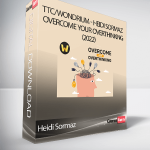TTC/Wondrium – Heidi Sormaz – Overcome Your Overthinking (2022)
Original price was: $169.00.$42.00Current price is: $42.00.
(This course is available and delivery within one day!)You’ll find the science behind these mental habits to be both fascinating and reassuring—no, you’re not alone in thinking the way you do, and no, your brain is not broken, it’s working exactly as human brains were trained to do centuries ago.File Size:4.922 GB Format File: 12 MP4 720p + PDF
- Description
- Reviews (0)
Description
TTC/Wondrium – Heidi Sormaz – Overcome Your Overthinking (2022)
When is Thinking Possible? Overthinking?
We think as human beings. We are, therefore, thinking. But at what point is thinking unproductive? What is overthinking? Heidi You may be surprised at how many times you are guilty of overthinking.
Worrying:
This is the type of overthinking we’re probably the most familiar, and it’s usually phrased as “what if.” Worry is not based upon reality, probability, or fact. It’s based on fear and typically takes a scenario and focuses on a terrible outcome. For example, instead of wondering, “what if my project goes gangbusters successful,” you worry, “what if my project falls flat and the company pulls the funding”?
Rumination:
This type of overthinking is a type of repetitive thought you can’t seem to shake off. Two types of ruminations can be distinguished. (1) Depressive rumination—engaging in negative, repetitive self-focus. For example, you might dress more casually at dinner parties than your colleagues. You also spend a lot of time internally criticizing yourself which can lead to distorted thinking. Depressive rumination can quickly turn into a vicious cycle. (2) Angry rumination—which typically takes the form of blame. You might do this by replaying the words of an argument over and over again in your head. This can lead to anger and even adding evidence to your argument. This can lead to aggression, resentment and distorted interpretations.
Cognitive distortions
This type of overthinking leads to mistakes in thinking that can lead to excessive or unneeded emotional reactions. Cognitive distortions, also known as overthinking or habitual thinking, can make it difficult to evaluate a situation objectively. You might find a friend at a party who is not talking to you very often. The friend may think you are crazy or uninteresting. In reality, there is no truth value in those thoughts—You can’t read their mind or know their situation.
Do any of these scenarios sound familiar? If they do, it’s because as a species, overthinking is baked into our brains. Overthinking Fear is the foundation of all survival. We have learned to avoid dangerous situations using reinforcement. Fear has been a feature of evolution.-Automated learning is based on the assumption that we will survive. However, our brains can also analyze what could have been if we did not. hadn’t What happened next? How to avoid it. This feeling is known as anxiety.
You’ll find the science behind these mental habits to be both fascinating and reassuring—no, you’re not alone in thinking the way you do, and no, your brain is not broken, it’s working exactly as human brains were trained to do centuries ago. But more important than the history and science behind overthinking are the solutions that you’ll want to know.
Habits: Easy to Create, But Hard to Break
One of the foundations of cognitive behavioral therapy (CBT) is retraining your brain to break bad habits—whether they are overeating or overthinking. The first lesson is the most important. Heidi Engaged in mindful activities that help to draw attention away from your brain and into other areas.
Examining both theory and practice, she’ll walk you through a variety of techniques, including seated exercises and yoga practices that allow you to occupy your physical self, while also talking you through ways to focus your mind to occupy your mental self.
Some of the experiences Heidi This will allow you to:
- Short seated and standing exercises (2–3 minutes each) that can be easily incorporated into your life at any time,
- Yoga positions that are both basic and accessible
- Reciting mettā phrases,
- Visualization exercises
- Practice gratitude
She’ll offer you a toolbox of strategies that can be used before, during, or after being bombarded by your thoughts. As you become more comfortable with each of these tools, you’ll feel more confident that you can make a quality choice about which tool to use in any given moment to help yourself end overthinking.
As Heidi notes, change is not a linear process—It’s more like a very wavy line that gradually increases in small amounts over time. You’ll need to give it time and practice, but with the new tools and information that she provides, you’ll be on your way to lessening the burden of overthinking.
Get TTC/Wondrium – Heidi Sormaz – Overcome Your Overthinking (2022) Download





Reviews
There are no reviews yet.